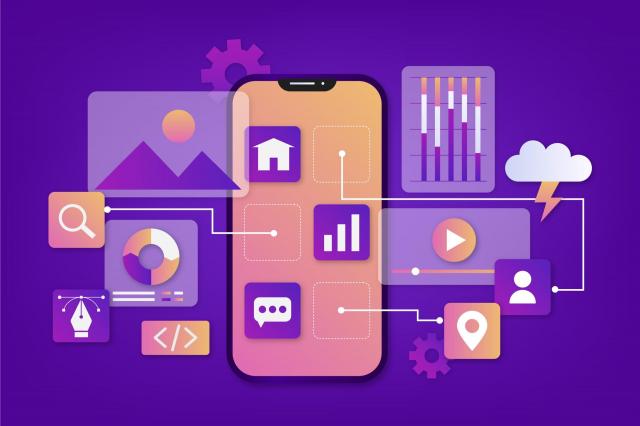Image by Freepik
As an entrepreneur, one of the decisions you need to make when developing a mobile application is whether to go for Native or cross-platform development. Both have their pros and cons, and the choice you make depends on your specific needs and goals.
Native App Development involves creating an application that is optimized to run on a particular platform or operating system, like iOS or Android. Alternatively, cross-platform development involves creating an application that can run on multiple platforms like iOS, Android, and Windows.
Here are some of the factors you need to consider when deciding which approach to take:
-
-
Development Time and Cost
-
Native app development takes longer and costs more than cross-platform development. This is because you need to create separate versions of the app for each platform. Cross-platform development, conversely allows you to write the code once and deploy it across multiple platforms, saving time and cost.
-
User Experience
Native apps offer better user experience because they are optimized for the specific platform they are running on. The platform’s built-in features, like camera, mic, and GPS, integrate seamlessly with apps. Cross-platform apps may not provide the same level of user experience as native apps.
-
App Performance
Native apps are faster and more responsive because they are designed to work with specific hardware and software of the platform. Cross-platform apps may not perform as well as native apps, especially if they are not optimized for the platform.
-
Maintenance and Updates
Native apps require separate maintenance and updates for each platform, which can be time-consuming and costly. Cross-platform apps, on the other hand, require only one codebase to maintain and update, making the process more efficient.
-
Target Audience
Your target audience can also influence your decision. If you are targeting a specific platform, such as iOS or Android, then native development may be the best option. However, if you are targeting multiple platforms, cross-platform development may be the better choice.
So, what are the advantages and disadvantages of native and cross-platform app development?
Advantages of Native App Development:
- Better user experience: Native apps offer better user experience because they are optimized for the specific platform they are running on. They also have access to the platform’s native features, such as camera, microphone, and GPS, which can be seamlessly integrated into the app.
- Faster and more responsive: Native apps are faster and more responsive because they are designed to work with the specific hardware and software of the platform.
- Access to native features: Native apps have access to the platform’s native features, which can be seamlessly integrated into the app, providing a better user experience.
Disadvantages of Native App Development:
- Development time and cost: Native app development takes longer and costs more than cross-platform development because you need to create separate versions of the app for each platform.
- Maintenance and updates: Native apps require separate maintenance and updates for each platform, which can be time-consuming and costly.
Advantages of Cross-Platform App Development:
- Faster development time: It allows you to write the code once and deploy it across multiple platforms, saving time and cost.
- Lower development cost: It is less expensive than native development because you only need to write the code once.
- One codebase for maintenance and updates: It requires only one codebase to maintain and update, making the process more efficient.
Disadvantages of Cross-Platform App Development:
- Limited Access to Native Features: Cross-platform app development tools are designed to support multiple platforms, which means they may not have access to all the native features of each platform. This can affect the user experience and limit the functionality of the app.
- Compatibility Issues: Cross-platform apps are often developed using third-party tools, which can lead to compatibility issues with different platforms and devices. It can also be challenging to keep up with the frequent updates and changes in platform-specific features and functionalities.
- Lower Performance: Cross-platform apps may not perform as well as native apps, especially for more complex applications. This is because it rely on abstraction layers and may not be optimized for specific hardware and software, leading to lower performance and slower load times.
- Debugging and Testing: It can be more challenging to debug and test, as issues may not be apparent until the app is tested on multiple devices and platforms. It can also be more challenging to reproduce issues and diagnose problems in a cross-platform environment.
- Reduced Flexibility: It can limit the flexibility of the development process, as developers may need to work within the limitations of the cross-platform development tools. This can affect the ability to customize and optimize the app for specific platforms and features.
To Recap:
Both native and cross-platform app development have their advantages and disadvantages. As an entrepreneur, it’s essential to consider your specific needs and goals when deciding which approach to take. While native app development can offer a better user experience and performance, it can be more time-consuming and expensive. Cross-platform app development, in contrast, can save time and cost, but may result in compatibility issues and reduced performance. Ultimately, the decision depends on your app’s requirements, target audience, and available resources. TULI eServices Inc. is dedicated to professionally assisting entrepreneurs in their search for app development solutions. We have experience in developing both native and cross-platform apps for various industries and platforms, including iOS and Android. We provide guidance on the pros and cons of each approach and recommend the best technology stack for our project.
Happy Developing!!!
Image by freepik
The post Comprehensive Guide to Native and Cross-Platform App Development for Entrepreneurs! appeared first on TULIeServices.
This post first appeared on Why Should You Optimize Voice Search For A Futuristic SEO Practice?, please read the originial post: here

